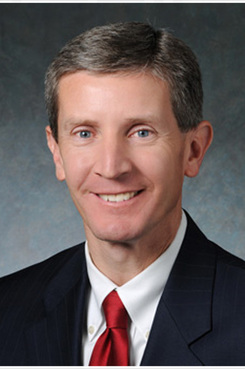 Photo: Diego M. Radzinschi/ALM
Photo: Diego M. Radzinschi/ALM
In a rare move, the American Bar Association has deemed Husch Blackwell senior counsel Steve Grasz “not-qualified” for the federal bench after President Donald Trump nominated the Omaha, Nebraska-based lawyer for a seat on the U.S. Court of Appeals for the Eighth Circuit.
Citing concerns about his temperament and the possibility that Grasz’s personal biases would impact his ability to be fair as a federal judge, the ABA offered a stinging review of the Husch Blackwell lawyer in a statement issued Monday. The bar group’s evaluation comes before Grasz, who was nominated in August to be an Eighth Circuit judge, is scheduled to undergo a U.S. Senate nomination hearing on Wednesday.
 Leonard Steven Grasz, senior counsel with Husch Blackwell.
Leonard Steven Grasz, senior counsel with Husch Blackwell.
The ABA committee routinely reviews the qualifications of nominees for positions on the federal bench and issues ratings of “well qualified,” “qualified,” or “not qualified.” In Grasz’s case, the rating came after the ABA reviewed his writings and conducted confidential interviews with more than 200 lawyers and judges.
Several of those interviews suggested that “he would be unable to separate his role as an advocate from that of a judge,” and revealed instances in which Grasz was “gratuitously rude,” the ABA committee said. The group’s statement was issued by Pamela Bresnahan, a Vorys, Sater, Seymour and Pease partner who currently chairs the ABA’s standing committee on the federal judiciary.
The committee also pointed to concerns about Grasz’s past experience as a lobbyist and a “passionately-held social agenda,” which included staking out a pro-life position in a law review article he wrote in 1999 regarding the legal precedent surrounding abortion.
“The evaluators found that the people interviewed believed that the nominee’s bias and the lens through which he viewed his role as a judge colored his ability to judge fairly,” Bresnahan’s statement said. “It was also clear that there was a certain amount of caginess, and, at times, a lack of disclosure with respect to some of the issues which the evaluators unearthed.”
At Husch Blackwell, Grasz serves in a senior counsel role within the firm’s business litigation, appellate, government affairs and federal and state regulation practices. He is a former Nebraska chief deputy attorney general and his firm biography says he “has devoted both his personal and professional career to advancing Nebraska agriculture, business and government.” He didn’t immediately respond to a request for comment on Tuesday.
Husch Blackwell’s CEO and managing partner Greg Smith said in a statement that the firm doesn’t have any hesitations about Grasz’s qualifications for the judicial nomination.
“Steve has set a high standard throughout his career in the areas of professional competence, integrity and temperament, and we continue to support without any reservations his nomination for this appointment,” Smith said.
The ABA committee’s not qualified rating of Grasz is rare, but not unprecedented. Earlier in October, the ABA issued a not qualified rating of another Trump judicial nominee, Charles Goodwin, a magistrate judge nominated to be a district court judge in western Oklahoma. Prior to this year, the last time a nominee was put forward who publicly received a not qualified rating was in 2006.
Although Grasz’s ranking is uncommon, the ABA Journal on Monday reported that it might be due in part to differences in approach to judicial nominations among recent presidential administrations.
Since the ABA began the nominee rating in 1953, presidents have typically submitted their potential nominees to the bar association before announcing them publicly. If a potential nominee received an unfavorable rating, the president could opt not to officially nominate the person, and the ABA’s rating would stay confidential. That sort of situation reportedly arose several times during the Obama administration, which chose not to go through with nominations of people who received a not qualified rating.
Former President George W. Bush, however, abandoned the typical approach and announced his judicial nominees before the ABA conducted its evaluation. Trump has taken a similar tack, meaning that the bar association reviewed Grasz and Goodwin only after they were named as nominees.
In all, Trump has nominated 58 people to the federal bench since taking office. The ABA has not yet rated all of the nominees, but of those that have been reviewed, the bar group has given “well qualified” ratings to 28 nominees, “qualified” ratings to 13 nominees and “not qualified” ratings to two nominees, according to ABA documents.





